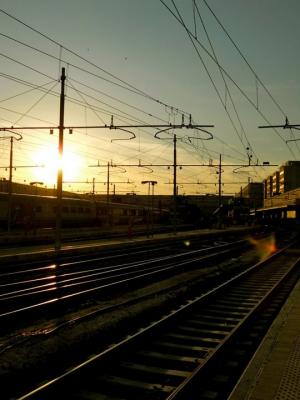By OPHELIA HU

Shick-a-shawing down Linea A, three stops from Cipro, Rome, I overheard a violin poorly played. Now and again, I curse my perfect pitch. A quarter tone drawled between D and D#, pulled headlong from a heavy-held bow like a dead rabbit from a hat. It was a nuisance. But I looked over to behold a blue-eyed boy crowned with thick brown hair and matching freckles.
He reminded me of my own brother when he had just begun to learn the violin. I recalled sitting cat-curled on the hot sofa those summer afternoons, correcting his intonation and watching him wibble between four strings. I remembered nights poured out at the piano bench, accompanying him while he slogged through concerti. What I played and what I dreamed were blurred, now. Once, he had taken out his violin on a stalled train and distracted the passengers with an impromptu show. They loved it. Maybe some meters up ahead, they were mopping up someone’s remains. Meanwhile, we allowed some giggling Paganini tickle us in that windless tunnel.
That was about twelve years ago – time pinched and plucked with two fingers, and still I hum with their remnant.
When the boy stopped playing, he gently shook a cup under the nose of each passenger, limp wrist saying he was sorry to be a bother. No one made eye contact with him, and I thought of those color-sucked, noseless busts at the Capitoline, where I once saw a woman with syphilis-eaten cartilage staring just as glassy-eyed back at faces like her own. Mi dispiace, I told the boy, and he walked away with my brother’s figure-eight gait.
Two stops from Cipro, sick with myself, I jumped out of my seat to find him. My stupid hands flapped along the poles, and that metronomic beat steadied me against the bends. I found him leaning against a door several cars down, fumbling to lay his violin to rest in its little velvet coffin. His case was cheap, economically shaped to give away its innards, bound only with two buckles that go puttup-puttup. I gave him my coins, and I burned with shame when they stuck to my palms. My own brother.
I softened, I slowed, and I held his case while he put away his wares. My very own brother.
The boy locked his bow into place and laid a cloth over the violin. He dropped the coins into his pocket. We zipped the case closed together. My fingers met his somewhere near the middle. I wanted to speak, but I said nothing. He smiled, thanked me, and exited. I held my breath and blinked at the ceiling until I exited at the next stop. My very own brother.
An escalator yawned before me, and as I rose like a slow glissando, I shrank. I stepped off of that roving tongue and became in the sun’s domain such small dust that I had to squint to see my own hands before me, and I cast no shadow.
Ophelia Hu earned her Environmental Studies B.A. in 2012 from Amherst College, where she wrote a novella about a misremembered Ethiopian environmental history for her senior thesis. The first two chapters of her new novel The Good Fight won the 2012 Williams-Mystic Joseph Conrad Essay contest, and her fiction will appear in HESA Inprint.




